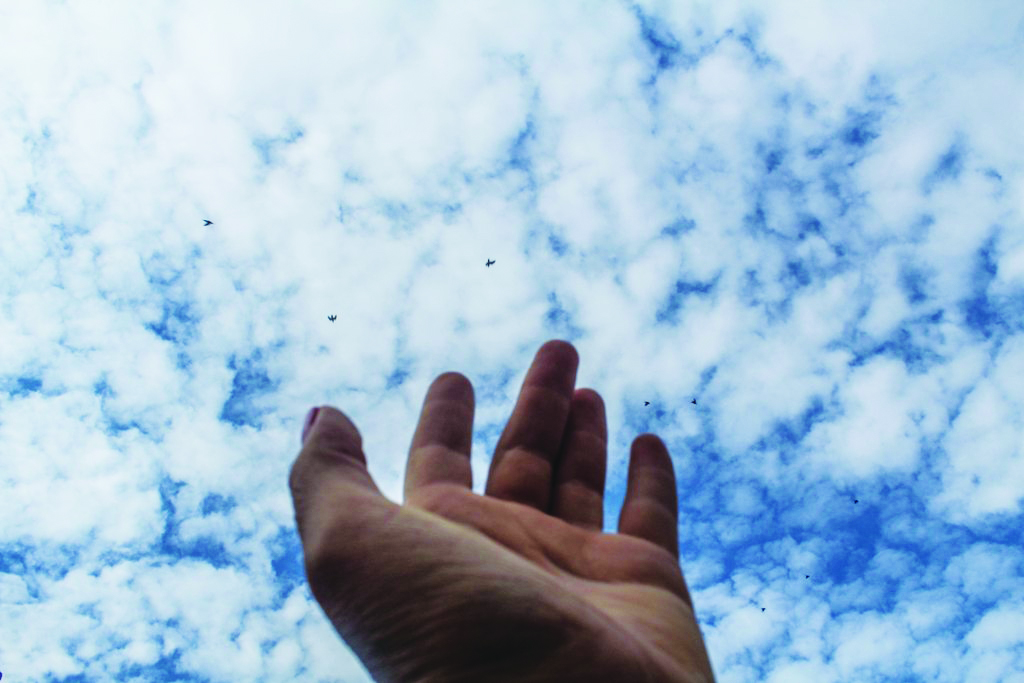'Music is my life,' shares a young Syrian young woman in Turkey
As I toured the World Vision-supported Urfa Community Centre in Ṣanliurfa, Turkey, I lingered in front of a photograph displayed on the wall of the art room. A hand, fingers outstretched, seemed to be trying to touch heaven, while birds circled high in the distance. Artistically beautiful, I imagined the inspiration for it was even more poignant. I asked if it would be possible to meet the photographer who took it.

Photo: Maila Hasso
Nawar Mustafa, the centre’s communications officer, knew exactly who it was: Maila, a young Syrian woman, who took photography classes at the centre. He phoned her, and she agreed to come to the centre to meet me.
When Maila arrived, I was impressed with her smile. We exchanged greetings in Arabic and English, as Nawar translated for us.
“You are a talented artist and poet, Maila. Can I please ask what inspired this photograph?”
“I like dreaming more than reality, so I took this photo,” Maila shared. Knowing that she was a Syrian refugee now living in Turkey, I could only imagine how true that was.
Curious, I asked, “What do you dream of?”
“A lot,” Maila said. “Continuing my studies, leaving Turkey... I cannot continue high school here.”
I expressed how difficult that must be for her.
“That’s why I’m dreaming,” Maila answered.
I asked her to share more of her story, and how she had arrived in Turkey. She explained she came suddenly. Her father left first, to arrange a place to stay. About two months later, he sent for the rest of the family. Her mother, four sisters, and brother now live in Urfa, as the city is commonly called.
“I am 18 years old. My brother Nuri is 23. Isra is 21, Hamal is 15,” Maila explained. The family fled Aleppo, Syria, three years ago, after her house was bombed. Her father’s three shops were also bombed, so he could no longer provide for the family. He had run a logistics business serving the university.
Only 15 years old when they left, Maila was in her first year at high school. They first fled to Afrin, where they stayed at her grandfather’s house. Then, her family moved to Urfa.
Maila now spends her free time at the community centre. Although it was her photography and drawings that caught my attention, her first love is music. She takes every music course the centre offers. In fact, when I was admiring her photograph, she was among the students practicing the guitar and saz, a traditional long-necked, stringed instrument, nearby. She also studies drawing and painting.
“I do art because it makes me feel better. Music is my life,” Maila shared. Imagining that she wanted to be a musician when she grew up, I asked what her ambitions were. Instead, she wants to be a doctor.
“Inshallah [if God wills], you will be,” I responded.
I reached for one of her drawings, depicting two broken glasses decorated with flowers. I asked Maila to translate the poem written on it. She said, “Be a professional photographer in your life, to always capture the good side of people, from a pure lens, from the perfect angle.”
“What were you trying to portray through these broken glasses?”
Maila explained, “At first our life was broken, like these glasses, even in Urfa. Then, roses began to grow.”
How beautiful! This young woman, who has already experienced such devastation – the bombing of her city, her home, fleeing her country, the inability to continue school – still manages to grow roses out of the thorns in her life. She continues to see the best in people, and difficult situations. Her eye is indeed a pure lens. She manages to hold onto her dreams, and continues to reach for them, even if they seem as remote as heaven.
“Maila, I hope your dreams come true.”
“Amin,” she responded, “inshallah.”